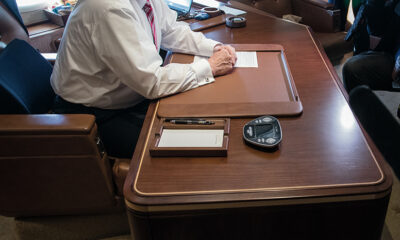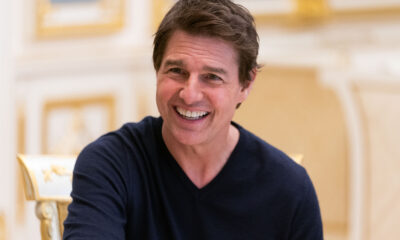Civilization
How To Understand Trump’s Jeremiad Against NATO Freeloaders
Donald J. Trump has criticized NATO for allowing freeloaders, and even questioned the alliance’ very raison d’etre.

Donald Trump sent a shiver through official Washington and America’s friends around the world recently when he once again fulminated against NATO allies who refuse to pay for their own defense. His specific target was NATO members that failed to meet their pledge of spending at least 2% of their GDP on their military. Their “free riding,” he stressed, is costly to the U.S., Britain, Poland, and other NATO members who pay more than their share.
The problem is not a new one, nor an easy one to solve. Rich allies in Western Europe have been free riding for decades. The U.S. has been complaining and coaxing them for just as long. Unfortunately, neither cajoling nor warnings have ever been enough.
The reason for that failure is simple. Allies who want to skimp on defense know that Uncle Sugar will ultimately pick up the tab, not out of generosity but out of self-interest. They know Washington has long considered it in America’s vital interest to defend Europe against Russian (or Soviet) aggression, whether France or Belgium pay their share or not. When countries know this, they can free load. And some do. They’ve got plenty of other uses for their money if the U.S. will pay for their defense.
This knotty problem is the essential background for Trump’s threat to allies who refuse to meet their NATO commitments. The former (and perhaps future) president was speaking to them and to isolationist voters in the U.S., not to Moscow, when he made his latest incendiary remarks. Although it wasn’t quite reported this way in the media, Trump claimed that when he was president the leader of one NATO nation in arrears on its funding asked if the U.S. would still come to its defense if it was attacked by Russia. Calling this bluff, Trump said no, adding that he would encourage Russia “to do whatever the hell they want” to any ally that fell short of meeting its alliance commitments.
President Biden denounced those comments as “dumb … shameful … dangerous … un-American.” One of Trump’s erstwhile national security advisors, John Bolton, added that the former president wants to withdraw entirely from the alliance.
Was Trump’s threat just hot air? It’s hard to be sure, but it’s a mistake to write it off as mere campaign rhetoric. It’s a serious threat, one that carries weight because it dovetails with Trump’s core “America First” message, with its implied isolationism on both national security and trade issues. Trump has repeatedly voiced his doubts about the world order the United States established in the late 1940s and has done so much to maintain.
It is precisely because America’s allies must take Trump’s threats seriously that he can use them to change the free-loaders’ calculus. They can’t be sure if, as president, he would be bound by NATO’s Article 5, which says an attack on any member is an attack on all. “Any member,” not just those that have paid 2%. They can’t be sure if he would try to withdraw from NATO altogether. What they do know is that he won’t repeat President Biden’s unambiguous pledge to defend “every inch of NATO territory,” whether or not some allies refuse to help.
Which allies are paying their full share? NATO data shows it is the United States and Great Britain, along with multiple Eastern European countries once yoked to the Soviet empire (Poland, the Baltics, and several Balkan countries), as well as Finland and Greece. France comes close to meeting the 2% standard. All other NATO members fall short, some quite substantially, although most have been increasing their defense expenditures since Russia invaded Ukraine.
Has Trump’s threat generated genuine uncertainty about what he would do if Russia attacked NATO allies that had fallen short of their security pledges? It would seem so. But another calculation tilts in the other direction. Germany, Canada, Italy, Denmark, Spain, Portugal, Belgium, the Netherlands, and Turkey don’t feel any imminent danger from Vladimir Putin. So why pay more for defense?
Still, U.S. allies and foreign-policy professionals were understandably shocked by Trump’s reckless rhetoric. But his comments were stunning in a second, quite different sense. They are shock therapy, meant to escape the collective-action problem facing the United States. The problem is that NATO allies have always believed that the U.S. will defend them, regardless of what they pay, because it is still in America’s interest to do so.
By introducing uncertainty and risk into the allies’ defense calculations, Trump hopes to force them to pay up, not from a sense of civic obligation, but out of fear. He did much the same thing during his first term, with some success. He is repeating that tactic now, with stronger rhetoric and the backing of a party that has become much more isolationist under his leadership.
Today’s Republican Party looks more and more like its old isolationist wing, led by Ohio Sen. Robert Taft after World War II. That movement was ultimately defeated by Sen. Arthur Vandenberg, who chaired the Foreign Relations Committee that approved the Marshall Plan and NATO, and then, decisively, by Dwight Eisenhower, who defeated Taft for the presidential nomination in 1952 and solidified the party’s internationalist stance. Ronald Reagan carried the banner forward.
Trump is ripping down that banner and reshaping the party. He is not a strategic thinker like Eisenhower or Richard Nixon. He is tactical and opportunist, always asking “What is best for me right now?”
Need proof? Just ask the dozens of aides who once worked closely with him, only to receive public tongue-lashings after they were forced out. Or, conversely, ask those who were welcomed back into the fold after they bent the knee to him. The former president thinks like a tough-minded real estate operator who views each project separately and doesn’t necessarily expect to do any repeat business with people on the other side of the table. That tactical, hard-nosed negotiating stance is how to best understand his threat to NATO’s free loaders.
What’s the upside and downside of making those threats?
The upside is simple. The more our allies worry about Trump’s volatility and the more they find his threats credible, the more likely they are to comply with his demands. The more they comply and pay up, the less U.S. taxpayers need to bear the excess costs of collective defense for the alliance.
The downside is more complicated.
The first problem is geographic. If the U.S. defends Poland, which is paying its full share, then it necessarily defends every country farther west from invasion. That includes Germany, Belgium, the Netherlands, Denmark, and Spain, all of which are paying far less than their NATO pledge.
Second, Trump’s threat to abandon some NATO members undermines the stability of the entire alliance. He hasn’t simply increased the uncertainty for some members; he has increased it for all of them. Putin may read Trump’s blast as a reluctance to defend, say, the Baltic states, even though Latvia, Lithuania, and Estonia have all paid up, or to assist Moldova, which is not a NATO member but cooperates closely with the alliance. (It has a significant Russian population in Transnistria, on the western border of Ukraine.)
At stake here is the stability and credibility of America’s NATO commitment. Remember, the goal of that commitment is not to defeat the Russian army in battle but to deter Moscow from launching an invasion in the first place. Such deterrence requires a credible threat to inflict overwhelming damage on any regime that attempts it. Trump undercut that message, even if he was simply trying to get all NATO members to pay up.
Third, NATO is not a tactical bargain. It is a long-term, strategic relationship – the oldest existing alliance in the world – based on its members’ shared interest in deterring Russian aggression (and Soviet aggression before that). The goals are to keep European democracies safe and strengthen their social, cultural, economic, and security ties to the United States.
Maintaining those ties and sustaining the military alliance is not charity. For decades, leaders of both parties have considered it in America’s fundamental interest, which is why NATO has been the anchor of America’s global policy since 1949. Now that America confronts the rising threat of China, it is even more important for America’s NATO partners to aid the collective defense effort in Europe. That means pulling their weight.
Whether Trump’s threats will help is an open question. If they force more NATO members to meet their commitments, he will have strengthened the alliance, at least in the short run, and American security with it.
But there is another, darker possibility. Vladimir Putin might read those comments as American reluctance to protect Europe. In that case, Putin could move beyond Ukraine, hoping not only to expand Russian power but to smash the entire American-led framework of European security. That framework is based on NATO, and NATO is ultimately based on America’s powerful military and our nation’s promise to defend its allies.
What Trump’s threat has done is more than raise two hard questions:
- How reliable is America’s promise to NATO?
- Will NATO’s free riders finally contribute to collective defense?
What he has said, for the first time, is that the answers to those two questions are deeply intertwined.
This article was originally published by RealClearPolitics and made available via RealClearWire.
Dr. Charles Lipson taught international relations at the University of Chicago, where he was the Peter B. Ritzma Professor in Political Science and the College. His research deals with international cooperation and conflict and with political aspects of the world economy. His most recent book on international relations, Reliable Partners: How Democracies Have Made a Separate Peace, explains one of the most striking features in world politics: why democracies do not fight wars against each other. (Princeton University Press, 2003). Dr. Lipson has also written extensively on international trade, debt, and investment. His book, Standing Guard: Protecting Foreign Capital in the Nineteenth and Twentieth Centuries, has been widely praised for combining politics and economics. It is concerned with the problems faced by successful corporations when they operate in difficult political environments around the world.
Professor Lipson's most recent work deals with the problems of forging international cooperation after the Cold War. He is currently writing about the sources of international order in the nineteenth and twentieth centuries.
-

 Accountability4 days ago
Accountability4 days agoWaste of the Day: Principal Bought Lobster with School Funds
-

 Civilization1 day ago
Civilization1 day agoWhy Europe Shouldn’t Be Upset at Trump’s Venezuelan Actions
-

 Executive2 days ago
Executive2 days agoHow Relaxed COVID-Era Rules Fueled Minnesota’s Biggest Scam
-

 Constitution3 days ago
Constitution3 days agoTrump, Canada, and the Constitutional Problem Beneath the Bridge
-

 Christianity Today1 day ago
Christianity Today1 day agoSurprising Revival: Gen Z Men & Highly Educated Lead Return to Religion
-

 Civilization2 days ago
Civilization2 days agoThe End of Purple States and Competitive Districts
-

 Executive2 days ago
Executive2 days agoWaste of the Day: Can You Hear Me Now?
-

 Civilization5 days ago
Civilization5 days agoThe Conundrum of President Donald J. Trump










